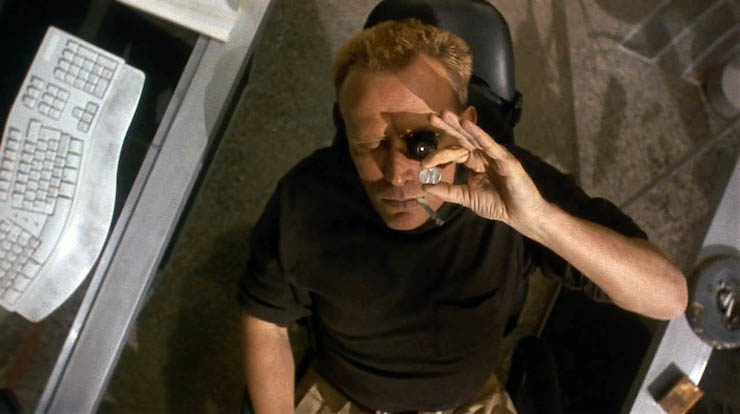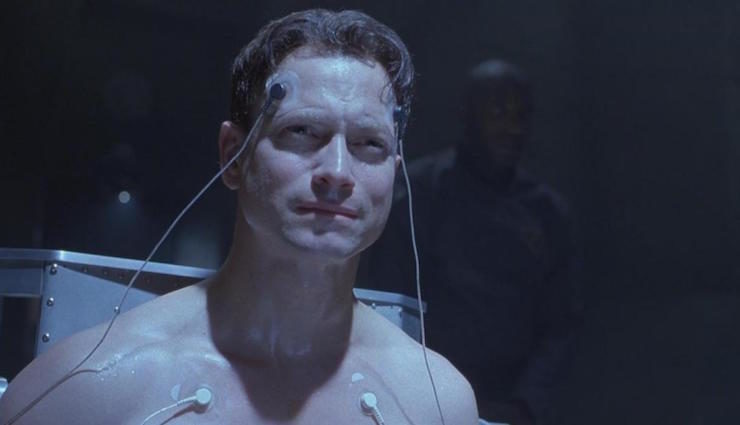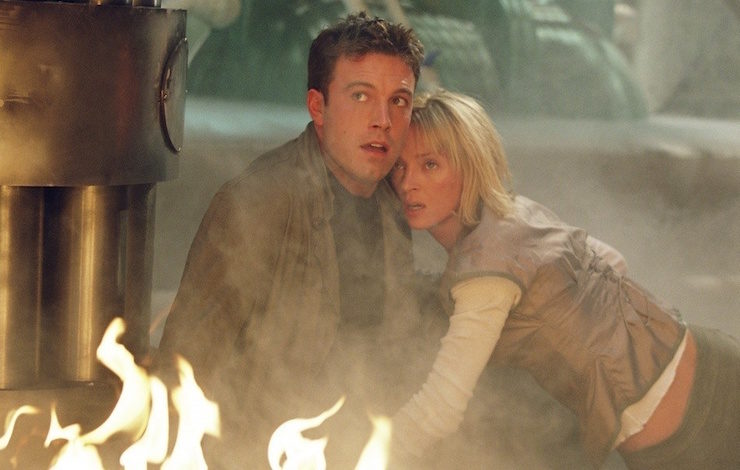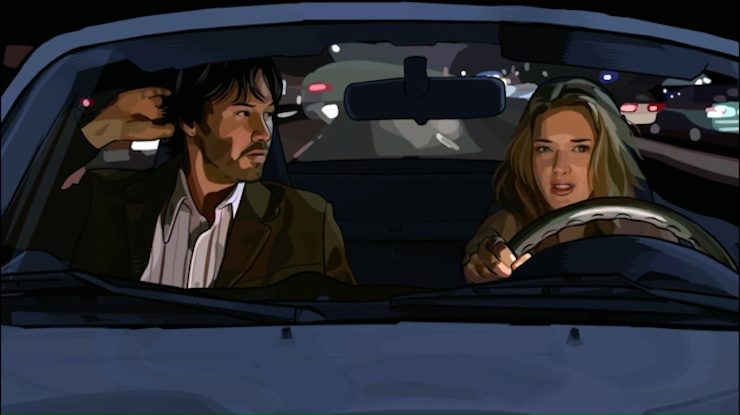Philip K. Dick’s Electric Dreams—an anthology series consisting of ten standalone episodes based on Dick’s work—arrives in the U.S. later this week. In the meantime, join me as I turn my scanner, darkly, toward the films made from Philip K. Dick’s work and try to figure out which of them are quality movies and which actually have something in common with the source material. I’ll give each movie two letter grades: one for being a good or bad movie and one for being faithful to the source material. (Note: faithful doesn’t always mean just following the plot, but capturing the themes and essence as well.)
Blade Runner

Based on the novel Do Androids Dream of Electric Sheep?
Movie Grade: A+
Faithfulness to Source Material: D+
The most famous Philip K. Dick adaptation is also widely considered to be the one of the best science fiction films ever made. Talking about why this movie is so damn awesome isn’t what this is all about right now, but let’s just say that it deserves all the praise it gets——but the movie and the novel are extremely different. In the original text, the replicants are called “andys,” or servant androids. Richard Deckard is married and wants to own a real, live sheep (an ewe, to be exact). Owning real animals is a huge status symbol in the novel, a notion that barely surfaces in the film. Further, Deckard himself isn’t the depressed noir gumshoe we see in the film. He’s actually trying to better himself and move up the career ladder at his job. That’s a far cry from Harrison Ford being called back to duty in the film.
If a huge fan of SF and Philip K. Dick had somehow never read Do Androids Dream of Electric Sheep? and had never seen Blade Runner, I might blasphemously suggest they could skip the novel and just watch the movie. There are a lot of other Dick novels and stories, which are actually more cohesive and much better.
Screamers

Based on the short story “Second Variety”
Movie Grade: D
Faithfulness to Source Material: C
Allegedly, Screamers has a cult following, though I’m not really sure why. The writer of the screenplay is a guy named Dan O’Bannon who is responsible for penning a host of other SF films including Dark Star, Alien, Lifeforce, Alien vs. Predator—and, notably, for adapting another Dick story, Total Recall. It’s not that Screamers is bad per se, it’s just that I don’t understand why anyone would like it. It’s also not really about what the story is about. Sure, the same basic premise of non-humans among us (“screamers”) is dealt with in a post- apocalyptic setting. However, the story takes place in what used to be France while this movie takes place on another planet. As with Imposter further down the list, there’s only so many different ways to do robot paranoia in a movie without the concept getting stale. Movies like Imposter and Screamers don’t do a lot for Dick’s central thematic questioning of our own humanity through non-humans. It’s almost as though the re-imagined Battlestar Galactica understood PKD better than some actual Dick movies.
Total Recall (1990)

Based on the short story “We Can Remember It For You Wholesale”
Movie Grade: B-
Faithfulness to Source Material: B
No one is rushing to give director Paul Verhoeven any medals for artsy subtlety. From Robocop, to Starship Troopers, to Showgirls, the name of the game is sex or violence and preferably both. We could think of Paul Verhoeven as the X-Rated Michael Bay, but that would be paying Michael Bay a compliment. As with his other movies, there is something to Total Recall. Is it a big dumb sci-fi action movie? Yes. Do you feel terrible watching it? No. As far as the source material goes, the biggest problem here is that in the short story Quail/Quaid never actually goes to Mars, but instead wants the memory of visiting Mars implanted in his mind. The story focuses more on the problem of trying to implant a false memory, but then that memory turns out to be real. It also serves up a nice twist which is lacking from the film. But Total Recall is in no way offensive to the short story. Instead, it’s exactly what it should be: “We Can Remember It For You Wholesale” + more guns and sex.
The 2012 remake was wholly unnecessary.
Confessions d‘un Barjo

Based on the novel Confessions of a Crap Artist
Movie Grade: C-
Faithfulness to Source Material: C+
Imagine Philip K. Dick reinventing himself as a kind of mash-up between Charles Bukowski and John Updike: this novel would be the result. A literary non-science fiction novel, Confessions of a Crap Artist depicts the woes of suburban living. The action, such as it is, takes place primarily in San Diego in the novel, but in the movie it’s transported to France! Neither the film nor the novel are particularly memorable, but naturally the changing of the culture and the setting from the novel does alter what the source material is all about.
Imposter

Based on the short story “Imposter”
Movie Grade: C
Faithfulness to Source Material: B
Both the story and the film suffer from the same problem: Philip K. Dick did better things with these same ideas and themes in other places. The notion that a man who is accused of being a replicant (and who is indeed a replicant and therefore a tragic figure) is explored better in Do Androids Dream of Electric Sheep? and elsewhere. Further, the film Blade Runner more subtly teases robot-or-not-robot dilemmas whereas the ham-handed Imposter makes all of its themes as obvious and predictable as its plot.
But it’s not all bad. Gary Sinise is pretty great in this movie, and it’s exciting enough to watch at times. Most interestingly, though, is that it’s not super inaccurate when it comes to the short story. In a lot of ways, it’s pretty much the same story. Certainly, in comparison with other Philip K. Dick adaptions, Imposter, in terms of faithfulness, can elicit a somber “close enough.”
Minority Report

Based on the short story “The Minority Report”
Movie Grade: A
Faithfulness to Source Material: C
One of Spielberg’s more robust movies, everything about Minority Report moves, is exciting and relies on its science fictional aspects to push the story forward. It also has pretty much nothing in common with the short story. John Anderton in the film is an in-shape Tom Cruise with six pack abs. But in the story, he’s overweight and a little older. As in Do Androids Dream of Electric Sheep? the main character in Dick’s original version is married, but single/divorced in the movie.
The list goes on and on. Anderton of the film shuts down PreCrime; in the story, he prevents his closure. The origins of the Precogs are different (and much harsher in the story!) and the nature of the conspiracy around Anderton has totally different motivations. Unlike Do Androids Dream of Electric of Electric Sheep? vs. Blade Runner, however, the spirit of this movie feels like it’s in the same family as the short story.
Paycheck

Based on the short story “Paycheck”
Movie Grade: D-
Faithfulness to Source Material: D-
Elegance is the main strength of this famous Dick story. After doing a job, which requires his memory to be wiped after the job’s completion, a man named Jennings finds himself on the run from the secret police. His promised paycheck isn’t there; he finds that he supposedly chose a bag of random stuff in payment, instead. The bag of random stuff of course proves to be really handy, and Jennings later realizes that there is a time-traveling version of himself helping him out. In contrast, the film is overly complicated, relies to heavily on action, and is just plain awful. It’s a bad movie based on an awesome story and you shouldn’t waste any amount of your paycheck on it. (I’m sure this joke was made a lot in 2003 when the movie came out.) Notably, John Woo has not made an American film since this movie released.
A Scanner Darkly

Based on the novel A Scanner Darkly
Movie Grade: A-
Faithfulness to Source Material: B+
Despite what you may have heard, I find the Richard Linklater film to be a fantastic interpretation of this particular Dick novel. The rotoscoping-animated style of this film seems like it would also be perfectly suited to the surreal musings of Dick’s non-fiction (particulary his Exegesis, should there be a future adaptation). In this case, both the film and novel are science fiction stories about real drug addiction. I find both to be highly compelling, and the competence of the performances and the style of the movie make up for changes made from the source material. This is the “arty” Philip K. Dick movie and it’s totally watchable and fantastic. Also, Robert Downey, Jr., Woody Harrelson and Winona Ryder are all at their best in this moive. Possibly the best adaptation of Dick’s work, if not the best overall movie.
Next

Based on the novelette “The Golden Man”
Movie Grade: D
Faithfulness to Source Material: F
I tend toward an unabashed, knee-jerk defense of bad movies with Nicolas Cage in the leading role, but this one can’t possibly be defended. A classic early Philip K. Dick story is completely gutted by a terrible mish-mash of a movie that was apparently made worse in rewrite hell. The story deals with a mutant named Cris who can see the future. He’s got golden skin, hence “The Golden Man.” In the movie he’s just Nicolas Cage, which I guess is our current society’s equivalent of a mutant. Talking about the “plot” of Next is hardly worth anyone’s time, but the biggest problems lie with Cris actually helping the government and fighting terrorism. While there’s nothing wrong with helping the government to fight terrorists, it’s not something Philip K. Dick was writing about and to have his name on this one in particular is pretty awful.
The Adjustment Bureau

Based on the short story “The Adjustment Team”
Movie Grade: B+
Faithfulness to Source Material: B-
Though time may end up being unkind to this movie, I have a soft spot for it. The production design tends toward a future-noir sensibility, which makes an audience member, perhaps unwittingly, think of Philip K. Dick. If Jonathan Lethem’s Gun, With Occasion Music were ever adapted into a movie, I see it looking something like this. The actors are all decent and plot (though wildly different from the story) moves along smoothly enough. Unlike a lot of other Dick film adaptions, the protagonists aren’t divorced loners, and instead the story revolves around love. Well, it’s all about love and fighting The Man. Philip K. Dick was all about fighting The Man, but didn’t tend to be overtly romantic. I don’t think this one misrepresents him by having a relationship so central to the plot. Plus the notion of this secret society controlling everything behind the scenes is classic conspiracy theory porn. Best of all, it makes you want to go read the short story.
An earlier version of this article was originally published in August 2012.
Ryan Britt is a longtime contributor to Tor.com. He is the author of the book Luke Skywalker Can’t Read and Other Geeky Truths and is a staff writer for Inverse.com. He lives in New York City.











Total Recall is an A- at WORST. I’d only be willing to negotiate upwardly.
What makes you say that Quaid actually got to Mars in the movie? It could all be implanted memories. In my mind, the movie should have ended with him waking up next to Sharon Stone, saying, “Honey, I just had the strangest dream” and then she kills him, only for him to wake up next to Rachel Ticotin, “Honey, I just had the strangest dream” and then she kills him, lather rinse repeat.
I didn’t realize Screamers was PKD. It’s not a great movie, but it’s entertaining and I like it. The sequel is a total pile of **** though.
I wonder how the Man in the High Castle would score on this list.
I realize it didn’t exist in 2012 (when the article was first published), but I’d be interested to see rankings for Man in the High Castle.
I like Screamers. For the time it was released, before the modern sci-fi tv and movie renaissance, it was pretty amazing. Plus Peter Weller. His presence acts as a floor for watchability: it just can’t drop too low if Weller is in it.
I felt that screamers had an interesting note of hope and despair in its ending that was an interesting variation on the ending of Second Variety.
In the ending of the story the main character realizes that he has been tricked into letting the ‘screamers’ past him and into society to wreak havok but takes some solace in his realization that they have also ‘evolved’ up to a state where they will destroy each other as much as humans.
In the ending of the film the MC does not realize that there is a screamer with him on the escape craft heading for civilization, but he (and the viewer) have learned that they have begun to evolve to a point where they can understand love and self sacrifice.
In both versions the screamers escape into the wider world but at the same time there is also a small ray of hope about how they are evolving. In one version they may turn on each other and in the adaption they may be able to choose not to be just killing machines. Glimmers of hope approached from opposite ends of being more human.
One more PKD adaption I’d add to this list is an episode of Deep Space 9 called Whispers which, to me, is clearly based off of Imposter. In this episode Chief O’Brien notices everyone is acting strangely and secretively in the run up to some important peace talks and suspects something is up, everyone else’s behaviour gets increasingly suspicious and aggressive towards him and he ends up on the run while everyone is attempting to track him down. He heads to the planet that is the center of the peace talks to try and warn them of the conspiracy and there discovers the real O’Brien after taking a mortal wound. The now revealed to be a ‘replicant’ O’Brien dies with the words “Tell Keiko I love…” The only real difference between this DS9 ep and Imposter is that it does not end with a world shattering Kaboom when he discovers that he is the fake. (Well ok, in this ep he does not know that there is a fake until the end but it still seems like a damn close adaption to me.)
I too am a big fan of A Scanner Darkly, and I wonder why you scored it so low (B+) on Faithfulness to Source Material. It seemed to me to be very true to the source; good things were left out, but the heart of the story is still all there.
There were a couple on the list I hadn’t heard of, and a few left off. Has anyone but me seen Radio Free Albemuth? Yes, an adaptation of Dick’s crazy semi-autobiography, filmed on a shoestring. I’d give it a C Movie Grade, A- Faithfulness score.
Surely, having Jessica Biel in “Next” bumps it up to a D+, right?
One thing i Would like to note about The Adjustment Bureau, I felt that there was Zero chemistry between the leads. That being said, your grades are spot on.
Any thoughts on what makes PKD so popularly adaptable as opposed to Heinlein, Sturgeon, Asimov, Clarke, Pohl, ect?
Paycheck is a favorite of mine! It’s one that I always have to stop and watch if I’m flipping channels! I wish there were more than a sentence to justify that low grade…
Is it just me?
@10 So…Many…Jokes *innuendo overload*
@@.-@ I’d also like to know about Man in the High Castle. I’ve never read it, but the first season was quite good. Series deserves kudos for making an SS captain sympathetic.
Having read Man in the High Castle and enjoyed it and watched some of the Amazon show I would suspect a high grade for the show and moderate to low for faithfulness to the source story. The setting is exactly the same but the plot is pretty different. The book is more of a slice of life in this alternate universe but the show is a straight up thriller. IMHO anyway.
I take it that none of you have seen ‘Philip K Dick’s Electric Dreams’, the recent anthology series of Dick stories? It has everyone in it from Bryan Cranston and Steve Buscemi, to Holliday Grainger, Anna Paquin and half the cast of Game of Thrones, and a whole rake of Dick short stories brought to life. I’ve seen six episodes here and it ranges from the really excellent (Impossible Planet), to the creepy (Real Life and The Commuter) and the downright odd (Crazy Diamond).
So I’m probably going to hell, because I actually quite like Paycheck though, or maybe despite, it being kinda week in many ways (yes, I have a crush on Ben and who cares if that affects my enjoyment of a film, it’s not my concern, so there). Out of all of these films though, the one I most enjoy is actually The Adjustment Bureau (this preference legitimately has nothing to do with Matt Damon).
The Adjustment Bureau is a well-made movie, but it really does take some horrible liberties with the themes of “Adjustment Team.” (No definite article, please.) The story is a minor gem Dick’s ‘paranoid religious visionary’ category, strongly prefiguring themes from V.A.L.I.S., _Flow my Tears…_, etc., and NONE of that comes through.
The themes it does end up with are more or less completely absent from the story, which instead of being interested in ‘true love’ or free choice, is mostly about guilt over accidentally posing a risk to one’s loved-ones. (Dick’s guilt showing it’s head.)
Quality work, Mr. Britt. Now please to rank the episodic entertainments based on PKD’s work, eg Man/Castle and Electric Dreams?
I like the differences between A Scanner Darkly the written story and the film. The film removes the silly and strange in-story speculation that Substance D may have been created by the Soviets/aliens/who-the-heck-knows to focus on NewPath. I like how it’s clear that Donna Hawthorne was deliberately leading Bob Actur to become an unwitting mole in NewPath.
I still haven’t watched season 2 of The Man in the High Castle. Minor spoiler: I am still wondering about the major difference between the book and film – that the illegal item in the book and in the TV show, it’s film reel.
I just wish someone would adapt the Three stigmata of Palmer Eldrige for a movie I think that would be great.
“Total Recall” IS a dream. Why do I say this? The ending. The atmosphere machine is turned on, and the Martian sky is quickly filled with breathable air. Much too quickly. all fairness, if this were to happen in the real world, it would probably happen much more slowly.
I kind of fit your description. I first saw Blade Runner in the 1980’s; I didn’t read “Do Androids Dream of Electric Sheep” until 2018. During the interim, “Blade Runner” was the definitive version of the story for me. When I first attempted to read “Do Androids Dream” in the early 2000’s, I couldn’t get into it as I found it to large of a contrast from the movie. However, I’m grateful to have read it later as I greatly enjoyed the story, even where it differed from “Blade Runner”. I consider the movie and book to be two excellent artistic interpretations of a story, even though the book is the source material. ;-)